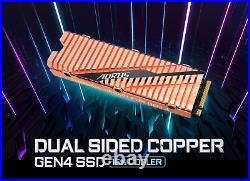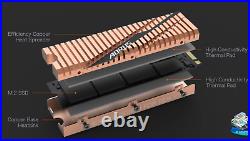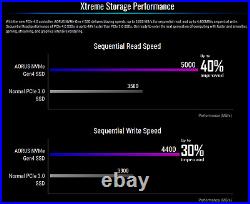












Brand New, Factory Sealed. Gigabyte Aorus Gen4 M. Interface: PCI-Express 4.0×4, NVMe 1.3. Sequential Read Speed : up to 5000 MB/s. Sequential Write speed : up to 4400 MB/s. Wear Leveling, Over-Provision technologies. TRIM & S. M. A. R. Fully Body Copper Heat Spreader. The World First PCIe 4.0×4 Controller, Phison PS5016-E16 controller, made by 28nm manufacturing technology. The advanced fabrication process ensures PS5016-E16 has enough compute power for ECC processing when adopting the latest 3D TLC NAND flash. PS5016-E16 also features eight NAND channels with 32 CE targets, DDR4 DRAM caching, and a PCIe 4.0×4 interface. As for features, the chip supports the NVMe 1.3 protocol, LDPC error correction, and Wear Leveling, Over-Provision technologies to improve reliability and durability of SSDs. TOSHIBA BiCS4 96 Layers 3D TLC (800MT/s). Toshiba BiCS4 NAND Flash optimizes circuitry and architecture by increasing to 96 layers for higher storage space per unit area. 800MT/s throughput on the AORUS NVMe Gen 4 SSD far exceeds that of PCIe 3.0×4 devices for superior storage performance. With the new PCIe 4.0 controller, AORUS NVMe Gen 4 SSD delivers blazing speeds: up to 5,000 MB/s for sequential read, and up to 4,400MB/s sequential write. Sequential Read performance of PCIe 4.0 SSDs is up to 40% faster than PCIe 3.0 SSDs. Get ready to enter the next generation of computing with faster and smoother, gaming, streaming, and graphics intensive rendering. The Full Body Copper Heatsink takes into account the heat transfer from key components on both the front and back of the device, the controller and NAND Flash. Full copper heatsinks have 69% higher heat transfer capacity compared to aluminum heatsinks giving AORUS NVMe Gen4 SSD the best heat dissipation for read/write performance. Compared with a plated M. 2 heat spreader, new efficient copper heat spreaders with 27 fins add more surface area which improve thermal transfer from heating sources to obtain thermal balance sooner. Both unique design make sure key components of PCIe 4.0 SSD to keep suitable working temperature under ultra high transfer rate. Why is keeping an SSDs at lower temperatures so important? Higher working temperature may cause data loss. The degradation factor of data loss could be a hundred times higher. With Full Body Copper Heat Spreaders, the AORUS NVMe Gen 4 SSD can operate at lower working temperatures to improve data storage reliability. Furthermore, SSDs can deliver extreme performance for longer periods.

